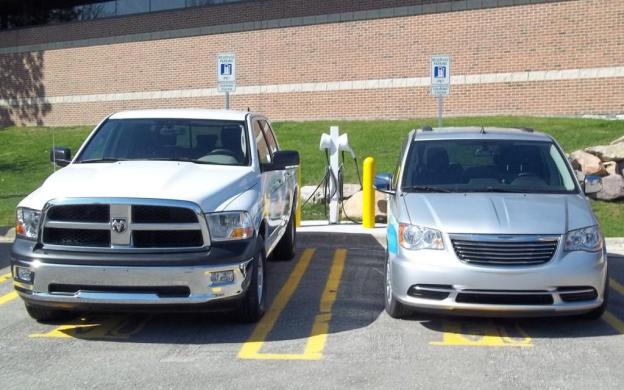 Overheating battery packs have put a stop to Chrysler’s plug-in hybrid test program. All 132 vehicles in the company’s test fleet have been recalled until modifications to the packs can be made.
Overheating battery packs have put a stop to Chrysler’s plug-in hybrid test program. All 132 vehicles in the company’s test fleet have been recalled until modifications to the packs can be made.
Three Ram pickup trucks were damaged when their 12.9-kWh lithium ion battery packs overheated, although Chrysler did not say what specific damage there was or why the battery packs overheated in the first place.
No one was injured; Chrysler said the vehicles were unoccupied when their batteries went nuclear.
Chrysler’s fleet of 109 Ram 1500 trucks and 23 Chrysler Town & Country minivans has logged 1.3 million miles in testing without incident up to this point. Chrysler says the trucks have averaged 37.4 mpg so far, while the minivans have averaged a Prius-beating 55.0 mpg.
Both vehicles operate with a two-mode hybrid system that works in concert with their stock gasoline engines, a 5.7-liter Hemi V8 for the Ram, and a 3.6-liter V6 for the Town & Country. Combined range is 655 miles for the truck, and 700 miles for the minivan.
Both vehicles’ battery packs are liquid cooled, and lithium ion batteries are the current standard for plug-in vehicles. Although both the Chevrolet Volt and Fisker Karma have been hit with battery fire scares, their batteries were found to be safe and stable.
Chrysler will adjust the batteries’ chemistry to correct the problem, install new battery packs in its fleet, and continue testing.
One unusual aspect of Chrysler’s plug-in design is its ability to recharge the power grid. In theory, owners would be able to use their cars to generate electricity and then sell the excess back to the power company. Toyota is testing a similar scheme, which uses a Prius to provide emergency power to homes, in Japan.
Chrysler’s ultimate goal is to sell plug-in hybrid vehicles to fleet buyers. There was discussion of selling the Ram plug-in to individual consumers, but that plan appears to have been shelved.


